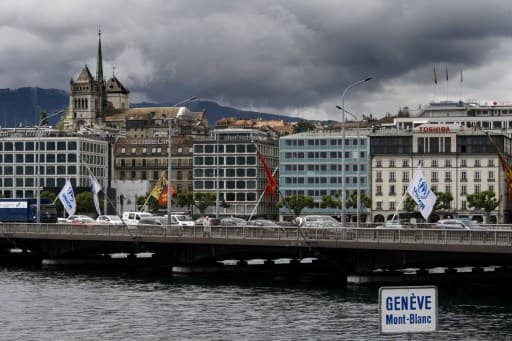Today in Switzerland: A roundup of the latest news on Monday

What makes Switzerland Europe's smartest country; a practice that reduces consumers' purchasing power; and more news in our roundup on Monday.
Switzerland named the smartest country in Europe
Yes, you read it right: Switzerland is the smartest European nation (out of 44 surveyed), according to a new study carried out by the UK-based educational platform TutorSpace.
To arrive at this conclusion, the company did not actually quiz the population on their general knowledge.
Instead, this finding is based on a thorough analysis of criteria such as education quality and access, digital literacy, and government investment, among others — all of which placed Switzerland at the top.
READ ALSO: 5 things you never knew about Switzerland's school system
Now let’s go from the ‘best’ to the ‘worst’…
Geneva is among world’s worst cities for drivers
After being named in December 2023 as the place in Switzerland for most car accidents caused by alcohol, Geneva now also has the title of one of the world’s most congested cities, where vehicles move at a snail’s pace.
This is the finding of the new 2023 TomTom Traffic Index, which compared road traffic in 387 cities worldwide.
Geneva ranks in the 22nd place: it takes 24 minutes and 40 seconds on average to travel 10 km by car.
What about Zurich?
Switzerland’s largest city is only slightly better in terms of traffic — it is ranked in the 28th place. It takes 23 minutes and 30 seconds to cover the distance of 10 km.
More woes for consumers: Switzerland is hit by ‘shrinkflation’
You may or may not have noticed while shopping for groceries that packages of many products have ‘shrank’ in comparison to their previous size — but their price hasn’t.
For instance, some yogurt containers, chip bags, chocolate bars, and other foods got slightly smaller, but their price remained the same.
This phenomenon, called ‘shrinkflation,’ means that if you pay the same price for lesser quantity, the product has become more expensive.
This is a finding of a Swiss consumer magazine, Ktipp, which asked Migros, Coop, and Lidl to comment on this practice, but none has.
Ahead this week: from coats to T-shirts
After a record cold Saturday, when temperatures in some regions dipped to -30C during the night, meteorologists are forecasting an unseasonably warm weather from Tuesday.
In some areas of Switzerland, such as the western and southern parts, temperatures of about 14C (plus, not minus) are expected.
Warmer weather will continue throughout the week in parts of the country.
If you have any questions about life in Switzerland, ideas for articles or news tips for The Local, please get in touch with us at [email protected]
Comments
See Also
Switzerland named the smartest country in Europe
Yes, you read it right: Switzerland is the smartest European nation (out of 44 surveyed), according to a new study carried out by the UK-based educational platform TutorSpace.
To arrive at this conclusion, the company did not actually quiz the population on their general knowledge.
Instead, this finding is based on a thorough analysis of criteria such as education quality and access, digital literacy, and government investment, among others — all of which placed Switzerland at the top.
READ ALSO: 5 things you never knew about Switzerland's school system
Now let’s go from the ‘best’ to the ‘worst’…
Geneva is among world’s worst cities for drivers
After being named in December 2023 as the place in Switzerland for most car accidents caused by alcohol, Geneva now also has the title of one of the world’s most congested cities, where vehicles move at a snail’s pace.
This is the finding of the new 2023 TomTom Traffic Index, which compared road traffic in 387 cities worldwide.
Geneva ranks in the 22nd place: it takes 24 minutes and 40 seconds on average to travel 10 km by car.
What about Zurich?
Switzerland’s largest city is only slightly better in terms of traffic — it is ranked in the 28th place. It takes 23 minutes and 30 seconds to cover the distance of 10 km.
More woes for consumers: Switzerland is hit by ‘shrinkflation’
You may or may not have noticed while shopping for groceries that packages of many products have ‘shrank’ in comparison to their previous size — but their price hasn’t.
For instance, some yogurt containers, chip bags, chocolate bars, and other foods got slightly smaller, but their price remained the same.
This phenomenon, called ‘shrinkflation,’ means that if you pay the same price for lesser quantity, the product has become more expensive.
This is a finding of a Swiss consumer magazine, Ktipp, which asked Migros, Coop, and Lidl to comment on this practice, but none has.
Ahead this week: from coats to T-shirts
After a record cold Saturday, when temperatures in some regions dipped to -30C during the night, meteorologists are forecasting an unseasonably warm weather from Tuesday.
In some areas of Switzerland, such as the western and southern parts, temperatures of about 14C (plus, not minus) are expected.
Warmer weather will continue throughout the week in parts of the country.
If you have any questions about life in Switzerland, ideas for articles or news tips for The Local, please get in touch with us at [email protected]
Join the conversation in our comments section below. Share your own views and experience and if you have a question or suggestion for our journalists then email us at [email protected].
Please keep comments civil, constructive and on topic – and make sure to read our terms of use before getting involved.
Please log in here to leave a comment.